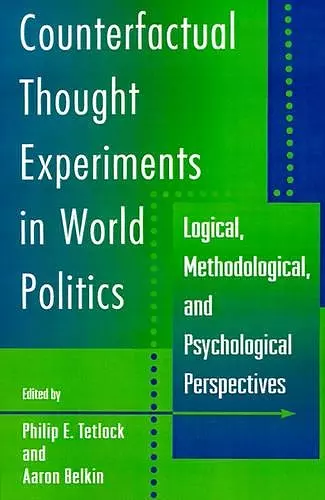Counterfactual Thought Experiments in World Politics
Logical, Methodological, and Psychological Perspectives
Philip E Tetlock editor Aaron Belkin editor
Format:Paperback
Publisher:Princeton University Press
Published:30th Sep '96
Currently unavailable, and unfortunately no date known when it will be back

Counterfactual Thought Experiments in World Politics is an important book for all social scientists, not only those who study international relations. The introductory paper, outlining different ways of using counterfactual arguments, is likely to become a standard reading in courses on methodology and research design. Many of the other chapters are outstanding; some are brilliant. When I next teach my graduate seminar on research design, this book will be on the required reading list. -- Robert Keohane, Duke University [This] is an important book for all social scientists, not only those who study international relations... When I teach my next graduate seminar on research design, this book will be on the required reading list. -- Robert Keohane, Duke University
Proposes a set of criteria for distinguishing plausible from implausible counterfactual conjectures across a range of applications. This volume makes use of these and other criteria to evaluate counterfactuals that emerge in diverse methodological contexts including comparative case studies, game theory, and statistical analysis.Political scientists often ask themselves what might have been if history had unfolded differently: if Stalin had been ousted as General Party Secretary or if the United States had not dropped the bomb on Japan. Although scholars sometimes scoff at applying hypothetical reasoning to world politics, the contributors to this volume--including James Fearon, Richard Lebow, Margaret Levi, Bruce Russett, and Barry Weingast--find such counterfactual conjectures not only useful, but necessary for drawing causal inferences from historical data. Given the importance of counterfactuals, it is perhaps surprising that we lack standards for evaluating them. To fill this gap, Philip Tetlock and Aaron Belkin propose a set of criteria for distinguishing plausible from implausible counterfactual conjectures across a wide range of applications. The contributors to this volume make use of these and other criteria to evaluate counterfactuals that emerge in diverse methodological contexts including comparative case studies, game theory, and statistical analysis. Taken together, these essays go a long way toward establishing a more nuanced and rigorous framework for assessing counterfactual arguments about world politics in particular and about the social sciences more broadly.
"The book sets out to examine the many roles that counterfactuals and counterfactual reasoning play in the study of world politics. It has many merits. The quality of the papers is high. It is well edited by Philip E. Tetlock and Aaron Belkin. It succeeds very well in building on earlier discussions of counterfactuals in social science, from Weber to Elster, and linking them with a wide range of concrete problems and issues in international relations."--Andrew Hurrell, The Times Literary Supplement
ISBN: 9780691027913
Dimensions: unknown
Weight: 510g
344 pages